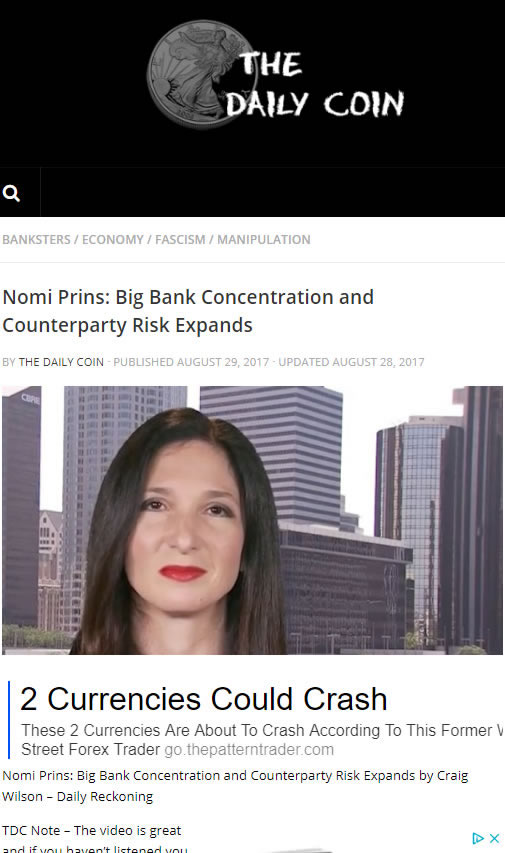Nomi Prins: Glass-Steagall More Live Under Trump than Obama
August 2017
Aug. 30, 2017 (EIRNS)—Financial analyst and author Nomi Prins spoke about prospects for passing Glass-Steagall in a video interviewon Sprott Financial’s "Ask the Experts" show on August 25.
Interviewer Michael Sprott:
"Given the central bank collusion, and given that the big money centers, or financial investment banks are their right-hand men, what chance do you give the Trump Administration for reinstating at least parts of the Glass-Steagall Act?"
Nomi Prins:
"Glass-Steagall is interesting, because it is a check, to a large extent, on the Federal Reserve System. Glass-Steagall is a kind of a counter to whatever crisis might happen, when it may happen, because it would prevent banks from being able to use their deposits as loans in the same bank holding company, as they also create and trade other types of riskier or more speculative, less-transparent securities.
"So the idea of bringing back Glass-Steagall, going back to the 1933 environment, as the Republican National Committee put in their platform last summer, is something that I think actually has more [emphasis in original] consideration right now in the U.S. Congress under the Trump administration than it had under the Obama administration. I say that because of two things. One, I have spent a lot of time talking with Congress people on both sides of the aisle on the issue of Glass-Steagall. I have directly seen the expressed interest in members on both sides, who have been looking at the avoidance of government and central bank intervention in the event of another financial crisis, when banks can say: we have your deposits; we have your cash, and we need your help, whether it’s in the event of a corporate default, something geopolitical, or because no structural change has happened.
"There is still risk in the financial system. What will help in the event of a real crisis, from ensuring that we don’t have to have another bailout, is to not have a connection between commercial banking and investment banking. That would mean banks would have to look at the risks that they are creating within their books. It would mean these risk-taking banks would have to independently take on their own ventures.
"There is a bill right now called H.Res. 790 with around 55 signed co-sponsors that is a bipartisan suggested bill that would reinstate Glass-Steagall. I think that is going to grow substantially in the upcoming session of Congress. It will be very difficult to pass, because none of the banks want it passed, but it is certainly something being looked at. The potential is better now than it’s been, and could, unfortunately, be better if there is another crisis. If we do have a crisis, it gets even better. It would be good if we could avoid that. But I think that’s where we stand."

